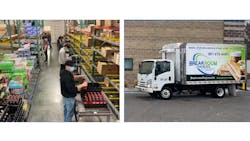Salt Lake City’s Breakroom Choices expands into Phoenix market
By Emily Jed, Contributing Editor
A leading Salt Lake City-based convenience services operation is crossing Utah’s southern border with a vigorous expansion plan, pursuing locations in the Phoenix market. Breakroom Choices (BRC) reported that it has already installed services in more than 25 locations in Arizona's capital region.
With several anchor accounts already open and more coming, the Breakroom Choices team is set to become a dominant regional player.
BRC is a family-owned operation managed by brothers Jon and Darren Evans. They started in the vending business more than 30 years ago working with their father, eventually acquiring the operation from him. Under the management of the second generation, the operation has experienced exponential growth over a short period of time.
"We do everything – micro-markets, coffee, pantry and vending,” Darren said. “In Phoenix, we have duplicated our industry-best customer service and we plan on growing this branch to rival if not exceed what we are doing in Salt Lake City.”
Darren credits the company’s success to the rapid growth of the micro markets, along with its partnerships with micro market tech firm Three Square Market and break room consultancy Vend Central.
BRC serves accounts of all sizes, ranging from locations with thousands of employees to those with as few as 50 employees.
“Each of our [micro] markets deploys touch-free technology and coolers and freezers that are critical in this new COVID-19 era," added Jon Evans. "We don't leave any details out in every customer we serve.”
While COVID-19 has dealt a blow to convenience services at many locations BRC serves, with reduced onsite populations throughout the pandemic, the company has found a silver lining in new demand for automated coffee solutions to replace conventional office coffee and pantry services.
“As we come out of COVID, there’s been a lot of shift away from pantry,” Jon said. “It had been so big for locations to provide company-sponsored snacks and drinks free to employees. But many have been stretched with their budgets from the impact of COVID and are looking to control costs.”
One model BRC has begun testing in smaller breakrooms with early success is Three Square Markets’ pandemic-inspired Cooler Café, a locked cooler with an attached kiosk that allows users to purchase products by the shelf, with a connected touchless brew-by-pack or bean-to-cup coffee machine. This allows one seamless transaction and shifts the cost from the traditional office coffee service and pantry model to the employee.
“Some locations still want to offer their employees some perks and benefits but want to move away from providing it all free of charge,” Jon added. “With this model, they can discount by subsidizing a portion of the cost or provide some basics for free, but not give too much away while they recover from COVID’s financial impact.”
Another reason locations have shifted away from conventional batch brewers is greater awareness about sanitation. Most bean-to-cup equipment manufacturers immediately responded to the pandemic with touchless options and hygiene top of mind that allow users to brew straight from their smartphones. BRC has had success with Bravilor Bonamat’s Sego 12, Cafection’s Encore and the Flavia C600, along with a new machine from Norm Tech that it’s been testing with the Cooler Café.
“We are all so hyper aware of germs, at least for the short term, so today’s touchless options offer all the specialty choices they’d get at the coffee shop but keep them in the office,” Jon commented. “The landscape has changed and it’s easier to not offer coffee for free, but they don’t want them to go out to purchase specialty drinks. Gone are the days of an airpot filled with one coffee. It’s actually a win-win for us to provide more premium equipment and services at a higher price point and to bring end users variety, higher quality and a cleaner experience.”
Even as more employees are transitioning back to the office, reduced populations will likely become the new norm at many. This is especially true with technology firms, which Jon said have said they will be adopting a hybrid model going forward. The on-demand capability of single-cup beverage systems helps adapt to the changing and unpredictable levels.
On the bright side, Jon added that some locations that provide pantry service for their employees have flourished and are still running at capacity or have even expanded. They continue to provide a broad selection of options including fresh food not only to keep employees onsite and productive but now also to minimize the risk of exposure to the virus.
Another plus for BRC related to the pandemic is that facility managers value having a single contact for all of their refreshment services to limit access to the facility and employees’ exposure to the virus.
“When something looks like a hardship, there’s always an opportunity for companies that look for it, and we’re finding many,” Jon remarked.
To support its business expansion, Breakroom Choices will be opening a new facility in Phoenix with the same capabilities found at its Layton, UT, headquarters.
"We take pride in being the company that can customize a breakroom to the employer needs, not just what bests suits us" Jon stated. "We learned long ago that providing a customer exactly what they want versus trying to fit them in to a one-size fits all mindset separates us from the local competition. And now, with the Phoenix market booming, we have launched the next stage of our company.”
About the Author

Emily Jed
Emily Jed is a business journalist who has devoted much of her career to covering the convenience services industry. She is a contributing editor to Automatic Merchandiser/VendingMarketWatch.com.
